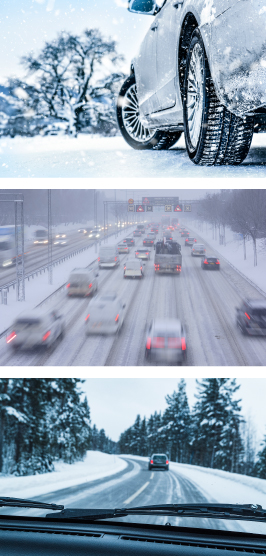Drive Smart: Winter Weather Driving
Tips for the Final Months of Cold
As winter slowly transitions to spring, the final months of cold weather can be some of the most dangerous for drivers. Melting snow, black ice, and unpredictable storms create hazardous road conditions that require extra caution behind the wheel. Whether you’re commuting to work or heading out for a weekend drive, staying alert and adjusting your driving habits for late-season winter weather is essential to keeping yourself and others safe on the road.
At PITT OHIO, we’re committed to helping all drivers on the road stay safe, so we’ve gathered a list of 10 essential tips to keep in mind whilst sharing the road in late-winter weather:
Winter roads demand your full attention, so avoid distractions and stay focused on your surroundings. Slightly opening a window can improve air circulation and help prevent drowsiness during long drives.
Always drive at a speed that allows you to maintain full control of your vehicle, especially when braking or maneuvering. Even if the speed limit is higher, adjust your speed to match road conditions and avoid unnecessary risks.
Keep at least an eight-second gap between your vehicle and the one ahead to allow ample time for stopping and maneuvering. Ice and snow can significantly increase braking distances, making extra space essential for safety.
Even vehicles with all-wheel drive or winter tires have traction limits, so don’t assume they can handle all conditions. Overconfidence in your car’s capabilities can lead to dangerous situations, especially on icy or snow-covered roads.
Winter conditions can change rapidly, so always scan the road ahead for potential hazards such as stalled vehicles, icy patches, or reckless drivers. Anticipating problems before they occur can help you react calmly and avoid accidents.
Quick turns, abrupt braking, or sudden acceleration can cause your vehicle to lose traction and skid. Make slow, controlled movements to maintain stability and keep your car under control.
Not everyone drives cautiously in winter weather, so expect unpredictable behavior from other motorists. Stay alert and be ready to react to sudden stops, erratic lane changes, or vehicles losing control.
Ice can be difficult to spot, especially in shaded areas, on bridges, overpasses, and in parking lots. Drive with extra caution in these areas and be prepared for sudden changes in road grip.
These areas tend to freeze faster than other parts of the road and may be covered in hidden ice. Passing in these spots can be extremely dangerous due to reduced traction and unexpected icy patches.
Hills can be especially treacherous in winter, as ice and snow make it harder to stop or gain traction. Always be prepared to stop, as traffic may be backed up or road conditions may be worse on the other side.
|
Winter driving requires patience, caution, and a clear understanding of road conditions to keep yourself and others safe. As the winter season winds down, unpredictable weather patterns can still create hazardous situations, making it essential to stay vigilant behind the wheel. By following these safety tips, you can reduce the risk of accidents and arrive at your destination safely. When in doubt, always prioritize safety over speed, and remember that no trip is worth the danger of driving in unsafe conditions.
Safe Travels!
